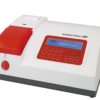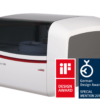Clinical Chemistry
VamGroup offers a broad range of routine and specialty tests in a variety of package concepts to serve the needs of modern and state of the art laboratories all over the world with performance and quality. In the same way analyzers and systems emphasize functionality and workflow requirements to meet contemporary customer’s and market’s demand.
A fast growing line of high quality products – all meeting high European standards (CE mark) – continues to be the essence of VamGroup’s success.






